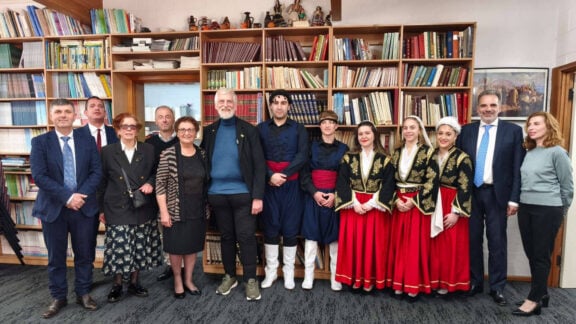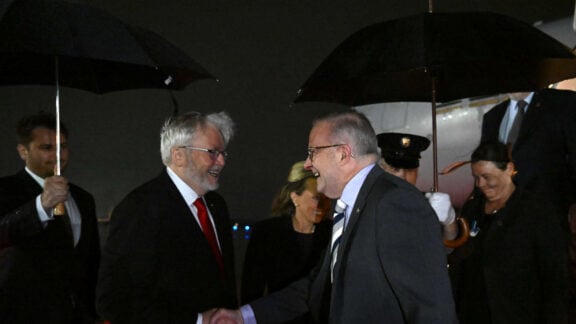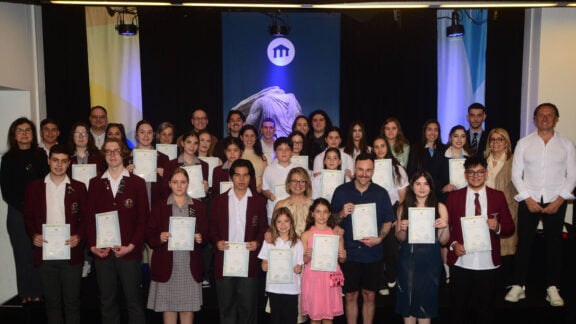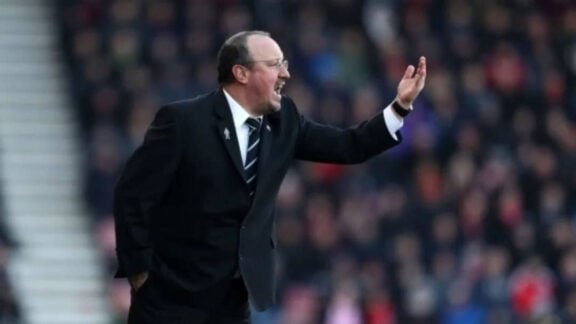Nick Polites OAM passed away on 14 January 2022; he was 94 years old. Nick was a much-loved iconic Melbourne jazzman, an early, influential and respected advocate for migrant services, a successful businessman and a life-long student of economics and social issues.
The child of Greek migrants, Nick was born in Melbourne in 1927. His father – Theodore Polites – was from Lefkas, a small Greek island near Ithaca in the Adriatic Sea. He and his brother John, both still teenagers, initially travelled down the east coast of Africa to South Africa in 1898. There they came into contact with Australian soldiers fighting in the Boer War. They convinced the two brothers to continue on to Australia where they arrived in the early 1900s.
Nick’s mother, Philia Tsarouchas, was a refugee from Alatsata, a provincial town near Smyrna (modern-day Izmir) in what is now Turkey. Like so many people of Greek heritage living in Asia Minor, in 1914, with the imminent explosion of World War I, her family was forced to leave Alatsata. At the end of the war, in 1919, they returned to their hometown, but with Turkey being poised to take over the entire region, they were again forced to leave in 1922 with only two weeks’ notice, and the family fled to mainland Greece. From there she travelled with other relatives arriving in Melbourne in 1923.
Nick’s parents met and married in Melbourne in 1924; relatively late (particularly for those times) for both of them – Philia being in her late twenties, and Theodore in his early forties. They had four children – Helen in 1925, Peter in 1926, Nick in 1927, and Maria in 1929. The family initially lived in St Kilda and then Elwood.
Nick went to Elwood Primary School and then Melbourne High School. At primary school he won an academic prize which was subsequently withdrawn after a complaint from another parent on the grounds that his father was not naturalised, albeit that Nick was Australian-born. This injustice became a great motivator in Nick’s academic life thereafter. He went on to be dux of his school and captain of the school football team. However, outside of school Greeks were not allowed to play in Australian football and cricket teams; so Nick and other Greek friends went on to establish their own football team which they called “The Olympic”.
In 1945 Nick got called-up for military service. On the same day the postman delivered two letters, one from the Australian Government to say he had to report for military duty and one from Melbourne University to say that, as one of a handful of the university’s top students, his military service was deferred. At the age of 20, Nick graduated from the University of Melbourne with a degree in Commerce. He then went on to do a second degree in Arts, majoring in history and philosophy.

Nick’s first conscious exposure to music occurred at age 11 in 1938. A childhood friend – Denis Athenis – loaned him Louis Armstrong’s Hot Five and Hot Seven recordings. Hearing what were then only ten year old recordings like ‘West End Blues’ for the first time was an epiphany which set the young Nick out on his life’s journey in the jazz world.
At first, Nick’s parents resisted his pleas to purchase him a musical instrument; they were concerned music would be a distraction from his schooling. Eventually, after four years, they relented, and in 1942 Nick got his start on a second-hand alto saxophone. Barely able to play, Nick was performing with amateur bands at church dances almost immediately. He puts down his early pre-proficient opportunities to the scarcity of older more accomplished musicians who would have been in military service during WWII. Nick was a natural with a good ear; he learnt fast. Even before acquiring an instrument he had memorised many of the tunes that would become his initial repertoire. By 16, in 1943, Nick had earned enough from these fledgling performances to buy his first clarinet; and he never looked back.
Like many of the early African-American jazzmen, Nick was unschooled in music. He was entirely self-taught and played by ear; not relying on written music at all (he described himself as a ‘slow reader’ of sheet music). Through his adult life Nick carried a vast repertoire of tunes in his head.
Nick had his jazz heroes, such as New Orleans clarinettist George Lewis, but did not model his playing style on any one of them in particular, he developed his own jazz voice informed by the classic Creole-style of clarinet playing. As a reviewer once proclaimed, he is “the real deal”. Louisiana Creoles were the descendants of mixed French and African American heritage. Nick told me that with his ‘Mediterranean complexion’ as a young man he passed for a ‘Creole’ when performing in New Orleans. This was a great convenience for Nick as ‘mixed-race’ bands were frowned upon by public officials.
Parental concerns about his academic future were unfounded; Nick went on to graduate from the University of Melbourne with degrees in Commerce, Languages, and Arts; and, later in life, a degree in Social Work. He also quickly moved on to clarinet as his preferred jazz instrument.

At university, Nick performed with amateur campus-based and other semi-professional jazz bands; among them the Varsity Vipers and then the Doc Willis and Alan Bradley bands. His big break came in 1951 when he joined Melbourne’s leading professional jazz band Frank Johnson’s Fabulous Dixielanders. In Australia this band was rated second only to Graeme Bell’s Sydney-based band. The Dixielanders were Melbourne’s pre-eminent jazz band of that time.
In 1954 Louis Armstrong and his band visited Australia for the first time and the Frank Johnson Band played to greet them as they disembarked from their Ansett flight on the tarmac of Melbourne’s Essendon airport. The entourage were invited back to Nick’s parents’ place for a welcome party. That evening Armstrong invited Nick to play with his world famous All Stars band in the Polites’ family home!
Nick played and recorded with The Dixielanders until late 1956. In September 1955 the band had a terrible car accident returning to Melbourne from a country gig. Band-member ‘Wocka’ Dyer was killed and Nick was laid up in hospital for two months recovering from a broken neck. The spark went out of the band after that episode. A staunch jazz traditionalist, Nick moved on when the band started performing more commercially-oriented material.
After leaving the Dixielanders, Nick teamed-up with Llew Hird, and later with English folk-blues vocalist Peter Shiells, and still later with German migrant Mookie Herman on double bass. Their appearance at the 1957 Australian Jazz Convention was a fillip to their popularity on the jazz scene. With Llew Hird’s departure in March 1958 leadership fell to Nick. They were renamed the Melbourne New Orleans Jazz Band. From September 1961 the band toured extensively in the UK, Ireland, and Germany until disbanding in London in April 1963.
Then, after a first visit to Greece, Nick embarked on his first of many pilgrimages to the birth-place of jazz – New Orleans. On arrival in ‘The Crescent City’, Nick made his way to Preservation Hall in the French Quarter and bumped into one of his jazz heroes – George Lewis – standing in the courtyard of this now iconic venue. They had previously met in London and George said to Nick: “I’m playing tonight, come along and join in”. Thus Nick became a regular at Preservation Hall for three months and then continued with regular performances there on subsequent visits.
During this time Nick even filled-in for George Lewis in his regular band when George had overseas performance commitments; and when George was in town, he and Nick played clarinet duets. As mentioned earlier, Nick’s ‘Mediterranean appearance’ meant he was presumed by many locals to be of Creole descent; which aided in side-stepping the local segregationist public policy at that time.
Nick must have felt he was in jazz heaven! He was playing with his idols: George Lewis, Kid Howard, Jim Robinson, George Guesnon, ‘Slow Drag’ Pavageau, Cie Frazier, and Dolly Adams on piano. In subsequent years Nick got to perform with the likes of Dizzy Gillespie, Thelonious Monk, Art Blakey and he befriended iconic performers like Mahalia Jackson.
Nick returned to Melbourne just in time for the 1963 jazz convention at the Kew Civic Centre. Early in 1964, Nick joined the popular Yarra Yarra Jazz Band as their leader for a couple of years; and he re-joined them after a spell. He moved on to team up with Sydney jazzman Geoff Bull for a European tour and his second visit to New Orleans where he was establishing his reputation with African American players and audiences who continued to presume he was a local Creole.
On returning to Melbourne in late 1966 Nick formed his own New Orleans Stompers which played for another five years. He continued with various bands through to the formation of the Louisiana Shakers in 1994. Nick was a fixture around the Melbourne jazz scene and toured extensively around the UK and Europe nine times. Nick performed his last gig with The Shakers on Christmas Eve 2018. Nick felt particularly indebted to the late Ashley Keating who led The Shakers and organised their overseas tours around the UK and Europe. The Shakers have been recognised as one of the true “keepers of the flame” of the authentic ethnic New Orleans jazz style.

At four successive Australian Jazz Conventions from 1957 to 1960, Nick was voted Australia’s best jazz clarinet player by fellow musicians and delegates. This discontinued practice was followed with a final convention concert by those voted the cream of all the players.
Nick has written and recorded several jazz compositions: Green Gate Serenade, Nickin’ Off and Helpin’ Hand Rag. A couple of these were winning tunes at the regular Australian Jazz Convention competition for new compositions. He was also a leader and administrator for Australian jazz. He was president of the 1960 Australian Jazz Convention and several subsequently; and a convention trustee for several decades. He was a founding member of the Victorian Jazz Club and on its management committee for many years.
On graduating from university in the late 1940’s Nick had taken-up the CEO position with his family’s confectionery manufacturing business through to its sale in 1971. Fortunately his brother-in-law was able to step in to manage the business when Nick was on tour overseas. After the sale of the family business, Nick moved into the migrant services sector; initially as a volunteer and then as inaugural director of the Australian Greek Welfare Society (now known as ‘Pronia’). A condition of government funding at the time was that AGWS must employ a qualified Greek-speaking social worker. Problem was that there wasn’t such a person in Victoria at that time. So Nick just went back to University and undertook a Bachelor of Social Work! Fortunately with his previous academic qualifications he was able to complete this degree within two years.
Nick was a member of the 1978 Galbally Committee whose seminal migrant services review and recommendations laid the foundations for the Australian Government’s multicultural public policy to this day. In 1981 he was awarded an OAM recognising his significant contributions in this field of his endeavours.
Nick never really ‘retired’. He continued performing as a founding member of the Louisiana Shakers until after he’d turned 90. Fans could regularly see him perform at The Clyde Hotel in Carlton on a Sunday afternoon right through to the end of 2018. After that he would still make impromptu performances from time-to-time, to the delight of his friends and fans.
Nick Polites’ many friends, musical collaborators and fans in the jazz community, and colleagues and admirers in the multicultural affairs sector, are indebted to the great legacy he leaves behind.









